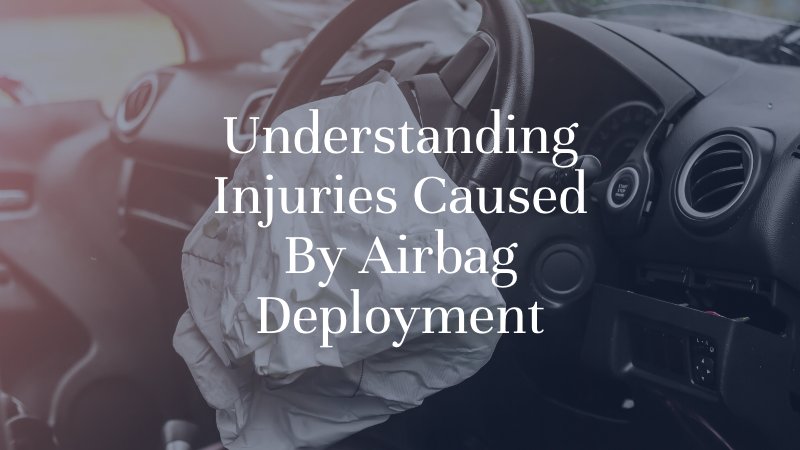Understanding Injuries Caused By Airbag Deployment
Airbags inarguably save lives, reducing driver deaths by 29% and front-seat passenger deaths by 32% in front-end collisions. When used appropriately with a seatbelt, they efficiently prevent a crash victim from ejection from the vehicle or from hitting the steering wheel or dashboard on impact. Unfortunately, airbag deployment may also become a source of injuries in an accident due to their extremely forceful deployment. The risk of airbag injuries in a car accident elevates substantially if an airbag doesn’t function correctly or fails to deploy appropriately. Although safety experts agree that the benefits of airbags outweigh the risks, they also acknowledge that airbags cause injuries, including severe injuries and even death, most notably in the now-recalled Takata airbags.

How Do Airbag Injuries Happen?
Airbags in vehicles come equipped with special sensors that trigger ignition within microseconds of a collision. The ignition process inflates the bag with gas in less than 0.05 seconds. This forceful deployment causes the airbag to explode outward, instantly providing a cushion between the motorist and the hard interior surfaces of the car. Even when functioning properly, the forceful inflation of the bag can cause injuries to a motorist’s head, face, and upper body.
What Types of Injuries Occur From Airbags In an Accident?
Injuries commonly occur to the upper portion of a crash victim’s body from the airbag even while the device prevents death. Common airbag injuries include the following:
- Broken nose
- Facial and dental trauma
- Eye injuries
- Ear injuries
- Broken collarbone
- Bruised or broken ribs
- Chest injuries
- Shoulder injuries
- Wrist injuries (when an airbag deploys as a driver holds the wheel)
- Respiratory problems from the gas that fills airbags (more common in those with asthma or other lung conditions)
Airbag injuries may be worsened in those who position their seats close to the dash. In the worst cases, airbag deployment can damage the heart muscle or cause aortic rupture, particularly when a motorist’s seatbelt doesn’t function appropriately in conjunction with the airbag, increasing the force of the impact.
What About Airbag Malfunctions?
The risk of serious airbag injuries increases when airbags fail to function correctly. For example, Takata airbags are the subject of a massive recall due to corrosion occurring to the gas canisters over time. Beginning in 2023, ARC airbags face a recall for a similar gas canister defect. The defect in both types of recalled airbags causes dangerous shrapnel to explode outward from the gas canister during ignition in an accident. In other cases, airbags may cause injuries due to malfunctions and defects such as the following:
- Improperly calibrated sensors that allow an airbag to deploy unnecessarily, such as when a driver hits a pothole
- Faulty sensors that fail to trigger airbag deployment when needed
- Too forceful deployment
- Faulty on-off switches or sensors
- Poorly installed or reinstalled airbags
- Electrical system malfunctions
- Counterfeit replacements after a crash
- Airbag design flaws
When a manufacturing or design defect causes an airbag to malfunction and it results in increased car accident injury or death, the injury victim or their family member may recover large truck accident compensation in Oklahoma City through a defective product claim.
Do I Need a Lawyer for an Airbag Injury Claim?
It takes a skilled investigation to identify the cause of injuries in an accident and to pinpoint an airbag defect or an injury resulting directly from the airbag. It’s necessary to document evidence of liability and present an Oklahoma City accident injury compensation claim to the appropriate entity and their liability insurance company along with a carefully calculated list of the injury victim’s damages like medical costs and lost wages. Call the Oklahoma airbag injury lawyers at Dan Davis Law for experienced legal representation in your claim.